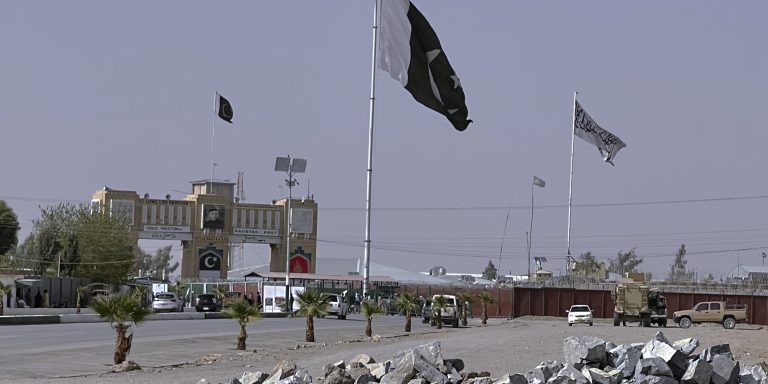INTELBRIEF
November 15, 2021
IntelBrief: Pakistan Agrees to Cease-Fire with Pakistani Taliban in Effort to End the Insurgency

Bottom Line Up Front
- The Pakistani government has come to terms on a cease-fire with the Tehrik-e-Taliban Pakistan (TTP), or Pakistani Taliban, in an effort to end a long-running and highly lethal insurgency.
- There are reasons to be pessimistic that the current cease-fire will hold, as similar initiatives have fallen apart in the past, leading to a resumption of violence.
- One of the most interesting aspects of the ceasefire is the mediation role played by Siraj Haqqani, leader of the Haqqani network and currently the Minister of Interior in the Taliban-led government in Afghanistan.
- If a peace deal between Pakistan and the TTP leads the latter to splinter, hardline members could look to defect to the Islamic State Khorasan (IS-K).
The Pakistani government has come to terms on a cease-fire with the Tehrik-e-Taliban Pakistan (TTP), or Pakistani Taliban, in an effort to end a long-running and highly lethal insurgency. Pakistan’s Prime Minister Imran Khan announced last month that he was pursuing talks with the militants. The cease-fire is currently slated to last until early December, if it holds, at which point a further extension could be negotiated. The TTP has been active since 2007 and is responsible for some of the bloodiest years in Pakistan’s recent history, operating out of its base in the country’s semi-lawless northwest. Pakistan’s Information Minister Fawad Chaudhry stated that the talks were centered around “state sovereignty, national security, peace in conflict zones along with social and economic stability.”
There are reasons to be pessimistic that the current cease-fire will hold. A similar effort in 2014 collapsed, with the end result being a Pakistani military offensive into the Federally Administered Tribal Areas (FATA), including North Waziristan, long a home base for an array of jihadists, including al-Qaeda militants. The terms of the current ceasefire remain opaque, and it is unknown whether Pakistan promised to release any TTP prisoners. The TTP has been responsible for gratuitous acts of violence over the past decade and a half, including an attack at a military-run school in Peshawar in 2014 that left over 150 dead, most of them children. The TTP regularly attacks Pakistani security services and military units, and has also targeted Chinese interests in Pakistan. With Beijing’s growing investments in Pakistan, including through the Belt and Road Initiative and China-Pakistan Economic Trade Corridor (CPEC), the Pakistani government is feeling pressure to keep foreigners safe from kidnappings and attacks staged by domestic insurgent groups, including TTP but also the Balochistan Liberation Army.
Perhaps one of the most interesting aspects of the ceasefire is the mediation role played by Siraj Haqqani, leader of the Haqqani network and currently the Minister of Interior in the Taliban-led government in Afghanistan. Since the Taliban takeover of Kabul in August, members of the Haqqani faction of the Taliban have consolidated control over key decision-making positions within the organization in Afghanistan and remain closely linked to the upper echelons of Pakistan’s security forces, including its infamous Inter-Services Intelligence, or ISI. Like the Haqqani network, the TTP is listed as a foreign terrorist organization by the U.S. Department of State. The TTP remains active in Pakistan, and since the Taliban’s victory in neighboring Afghanistan, there has been an uptick of TTP attacks against targets connected to the Pakistani state. Pakistan recently reached an agreement with another militant group, Tehrik-e-Labaik Pakistan (TLP). In this case, TTP seems to have leverage, and if the cease-fire is to develop further, the insurgents may seek to maximize concessions from the Pakistani government.
One possible outcome of a more robust and sustained peace agreement between Pakistan and the TTP is the splintering of the latter, with hardliners opposed to any deal. If that occurs, it could serve to replenish the ranks of the Islamic State Khorasan (IS-K), given the close connections between the groups. In 2015, IS-K was founded by disaffected TTP militants. Part of Islamabad’s strategy may be an effort to attenuate the TTP so it can focus on the growing IS-K insurgency. Pakistan has been aiding the Taliban in Afghanistan in its battle with IS-K insurgents, providing Taliban leadership with valuable information that can be used to target IS-K strongholds. The Taliban has been struggling to contain IS-K, which continues to launch attacks with impunity, especially in parts of eastern Afghanistan along the Pakistani border. But IS-K has demonstrated the capability to strike in Kabul, too, as evidenced by the complex attack on a military hospital just recently, which led to the death of a high-profile Taliban commander. The Pakistani military’s offensives against TTP have pushed many of its fighters just across the border into Afghanistan, and before the Taliban took control, Islamabad regularly accused Kabul of sheltering TTP militants, a claim the Afghan government flatly denied.